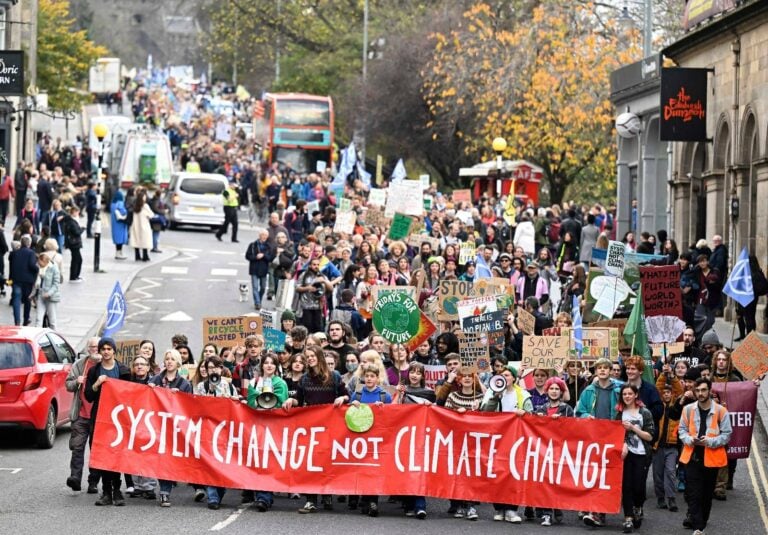
G20: One step forward, two steps back
On 24 and 25 September the G-20 in Pittsburgh will once again call for the signing of a trade agreement within the World Trade Organization (WTO). SOMO argues in a letter to the newspaper NRC that binding commitments regarding financial services as specified in WTO negotiations are actually an obstacle to creating an effective solution to the current financial and economic crisis.
The growth of free trade and global competition is the basic premise of WTO negotiations. Under WTO’s direction the General Agreement on Trade in Services (GATS) facilitated liberalisation of financial services in a way that made it almost irreversible. Partly because of this liberalisation and the increasing competition, governments established flexible regulation and monitoring systems to create attractive business environments for financial institutions. The exceptionally high profit margins, extreme expansionism and development of speculative and opaque financial products should have set alarm bells ringing but were ignored in the general euphoria.
Countries that liberalise their financial services in accordance with GATS rules are subject to major restrictions. For example, preventive measures such as limiting the scope of commercial financial institutions or the volume of their financial transactions are explicitly prohibited. Countries are also not permitted to prevent their local financial service providers from becoming 100% foreign owned. This has resulted in an increase in the size of banks over the past years to the degree that governments cannot permit banks to go bankrupt, as this would disrupt the functioning of the entire economy. Some countries have made use of the possibility of requesting certain exceptions to GATS rules. The Netherlands did not explore this option but went wholeheartedly for the liberalisation of financial markets and services.
The financial crisis has shown that blind faith in deregulated financial markets has led to the creation of a shadow financial system. A global "casino" of complex, speculative and interlinked financial products has been created that is subject to little or no monitoring or regulation. Society is now literally paying the price for the game that the financial conglomerates and speculators have been allowed to play. In a recently published book of the Social Cultural Planning Office the authors state that the rescue operations of the many Dutch financial companies and the incentives for the economy have saddled the Netherlands with a long-term budget problem. This will be at the expense of social policies, as is already evident in the Dutch budget proposal. In less developed countries, government budgets do not have room for rescue operations, and consequently these countries are even more vulnerable to financial and economic instability.
The liberalisation of financial services in the context of WTO negotiations should therefore be stopped immediately. However, if the G20 has its way WTO negotiations will be concluded before the appropriate international regulations and supervision of the financial industry are in place. In response to the crisis it is more crucial than ever that countries are able to exercise control on the financial sector and incoming and outgoing financial flows to curb speculative capital movements. Countries need to be given enough room in their policy making to be able to take measures that are in the interest of financial stability and sustainable development. They need to be free to withdraw their GATS commitments to liberalise their financial sectors without WTO sanctions. Starting points would be a financial sector that serves real economic development, provides high-quality and universal access to services and encourages a sustainable society. It will be to the credit of the Dutch representatives at the G20 in Pittsburgh if they take a stand and insist that coherent policies be put on the agenda.
Authors: Researcher Roos van Os and senior researcher Myriam Vander Stichele, Centre for Research on Multinational Corporations (SOMO)
A Dutch version of this letter was published in the Dutch newspaper NRC Handelsblad on 24 September 2009
see also recent SOMO publications on this topic:
- An Oversight of Selected Financial Reforms on the EU Agenda
- The deficits of the EU financial reforms
- Rethinking Liberalisation of Banking Services under the India-EU Free Trade Agreement
Related news
-
Why share buybacks are bad for the planet and peoplePosted in category:Opinion
 Myriam Vander StichelePublished on:
Myriam Vander StichelePublished on: Myriam Vander Stichele
Myriam Vander Stichele -
 The Netherlands: European champion share buybackPosted in category:Long read
The Netherlands: European champion share buybackPosted in category:Long read Rodrigo FernandezPublished on:
Rodrigo FernandezPublished on: -
 The trillion-dollar threat of climate change profiteersPosted in category:Long read
The trillion-dollar threat of climate change profiteersPosted in category:Long read Myriam Vander StichelePublished on:
Myriam Vander StichelePublished on:

